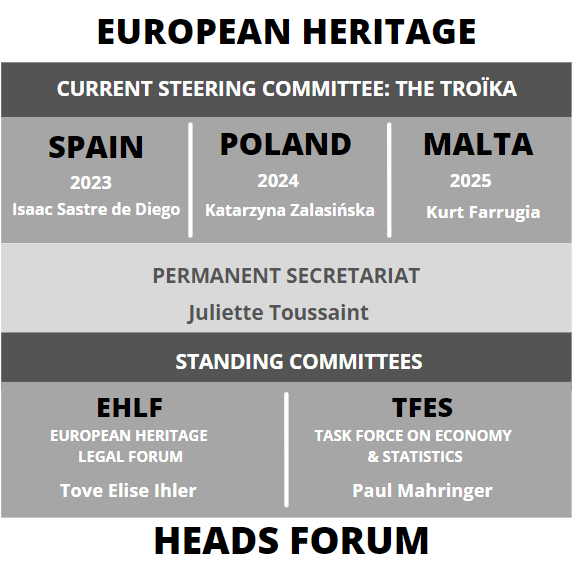Task Force on Economy and Statistics
Currently chaired by:
Mr. Paul Mahringer
Deputy Manager
Bundesdenkmalamt
Austrian Federal Monuments Board
The Task Force on Economy and Statistics, one of the two committees of the European Heritage Heads Forum, was established in 2012 at the annual meeting in Potsdam (Germany) in order ‘to create a common methodology for collecting economic data of cultural heritage’. The main aim of the Task Force is to formulate, at the European level, clear indicators on the socioeconomic contribution of immovable cultural heritage
By doing so, the Task Force wants to support the sector in building better statistics and in generating knowledge on the societal relevance of cultural heritage. Cultural heritage is being increasingly regarded as an indispensable resource for sustainable development (Conclusions on cultural heritage as a strategic resource for a sustainable Europe, Council of the European Union, May 2014). Quantifying this societal contribution will help the sector to implement more effective and efficient policies.
The Task Force on Economy and Statistics is currently working on collecting information on the gross value added and the jobs generated in
- The construction sector
- The real estate and property sector
- The tourism sector
- The cultural and creative industries sector
As from 2018, the Task Force received substantive support in its tasks from an external research team under the ESPON Targeted Analysis programme. This first collaboration led to an ongoing applied research.
COLLABORATION WITH ESPON
The EHHF Task Force on Economy and Statistics thus initiated two consecutive collaborations with the ESPON Secretariat.
ESPON I – Targeted Analysis – HERITAGE
“The Material Cultural Heritage as a Strategic Territorial Development Resource: Mapping Impacts Through a Set of Common European Socio-economic Indicators”
For more information, please visit:
www.espon.eu/cultural-heritage
ESPON II – Applied Research – HERIWELL
“Cultural Heritage as a Source of Societal Well-being in European Regions”
For more information, please visit:
www.espon.eu/HERIWELL
Background documents
A little bit of history
A European Heritage Summit was first organized in London on 26–28 April 2006 by Dr. Simon Thurley, former Chief Executive Officer of English Heritage. The mission of the Summit was to gather for the first time the European cultural heritage leaders who had the opportunity to exchange their experience and initiate common actions. It was attended by 23 European states which agreed in the Final Statement to continue to meet annually as a forum of European heritage heads, known as the “European Heritage Heads Forum”. Future hosting countries are chosen by general agreement at the annual meeting.


Permanent Secretariat - secretariat@ehhf.eu - Place Saint-Géry 23, 1000 Brussels
Cookie policy - Privacy policy - Copyright © European Heritage Heads Forum, All rights reserved.
Permanent Secretariat - secretariat@ehhf.eu
Place Saint-Géry 23, 1000 Brussels
Cookie policy - Privacy policy
Copyright © European Heritage Heads Forum
All rights reserved.

